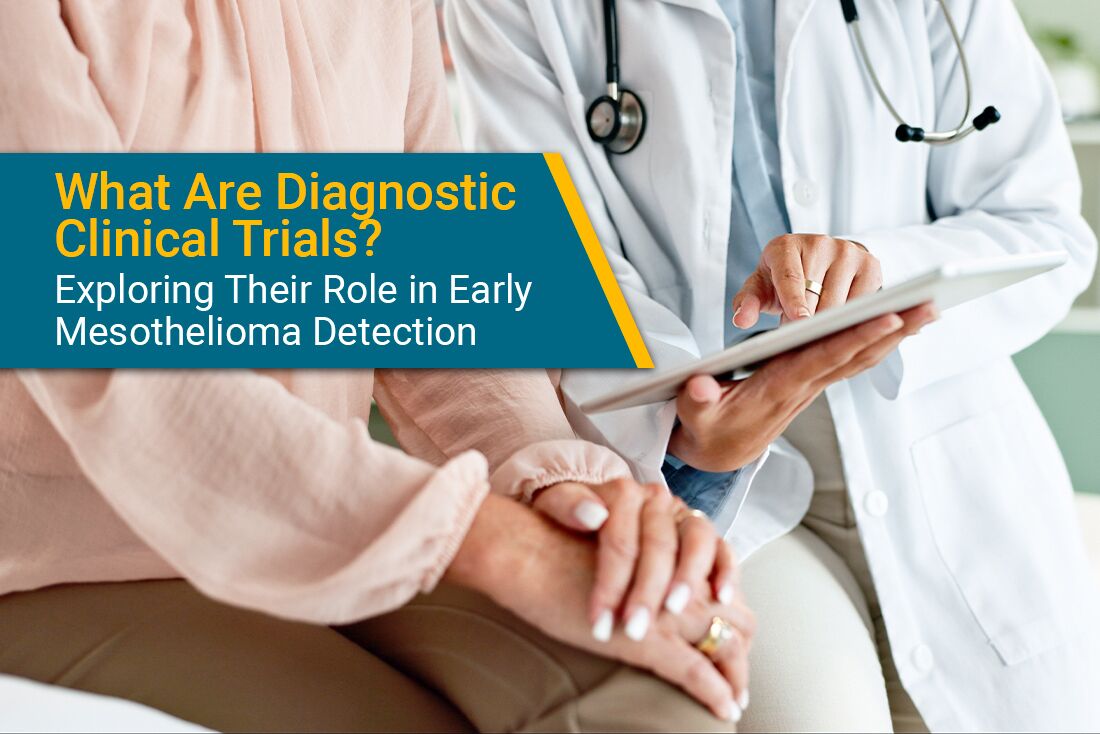Estimated Read Time: 3 minutes
Early detection can make all the difference when fighting aggressive cancers like mesothelioma. That’s where diagnostic clinical trials come in. These studies help scientists and clinicians develop better, faster, and more accurate tools to detect disease, sometimes before symptoms appear.
For mesothelioma, early detection could be the difference between eliminating tumors and a shorter survival.
What Are Diagnostic Clinical Trials?
Diagnostic trials are clinical studies that investigate new or improved methods for identifying a disease or condition. They aim to answer questions like:
- Can this test detect the disease earlier than current methods?
- Is it more accurate or less invasive?
- Will it reduce the time it takes to make a diagnosis?
These trials may focus on biomarkers, imaging technologies, blood tests, tissue samples, or machine learning models that help doctors make faster and more reliable decisions.
Why Are Diagnostic Trials Important?
A correct and timely diagnosis is the first step toward effective treatment. Diagnostic trials:
- Improve early detection, when diseases may be more treatable
- Reduce misdiagnosis and unnecessary treatments
- Lead to more personalized care by revealing molecular or genetic details of a disease
- Support screening tools that can identify high-risk patients before symptoms arise
For a cancer like mesothelioma, which is often diagnosed in advanced stages, there is an urgent need for earlier and more accurate diagnostic tools.
Diagnostic Trials for Mesothelioma: What’s Being Done?
Mesothelioma is caused by asbestos exposure and often presents at first with vague symptoms like chest pain or shortness of breath. These are symptoms of more common and less deadly diseases, such as pneumonia.
The ordinary aspect of the first mesothelioma symptoms can lead to delayed or missed diagnoses. Traditional diagnostic methods rely on imaging (CT scans) and invasive biopsies, which can be risky and time-consuming.
Thankfully, researchers are actively working on better ways to detect mesothelioma and give an accurate mesothelioma diagnosis earlier, and several diagnostic trials reflect this progress. One such way is to detect certain proteins unique to mesothelioma, such as mesothelin.
Examples of Mesothelioma Diagnostic Trials and Innovations
Biomarker Tests
- What they’re testing: Blood-based biomarkers to detect mesothelioma proteins such as mesothelin, fibulin-3, osteopontin, and HMGB1
- Goal: Develop a non-invasive blood test that can identify mesothelioma in asbestos-exposed individuals before symptoms appear
- Status: Some tests (like mesothelin-detecting tests) are FDA-approved for monitoring, but ongoing trials are refining accuracy and early detection capability.
Early Detection With Breath Analysis (Volatile Organic Compounds)
- What’s being studied: Using devices that analyze a patient’s breath to detect volatile organic compounds (VOCs) linked to cancer cells
- Benefit: Completely non-invasive and potentially useful in screening programs for high-risk workers
Advanced Imaging Studies
- Examples: Trials evaluating newer PET/CT or MRI scan techniques that could improve imaging sensitivity for early-stage mesothelioma
- Goal: Detect tumors that traditional scans may miss, or provide more precise staging to guide treatment
Artificial Intelligence and Pathology-Based Diagnostic Tools
- Focus: Use of machine learning models and artificial intelligence (AI)-driven pathology analysis to improve diagnostic accuracy from biopsy samples
- Benefit: Reduces diagnostic errors and may help predict prognosis based on the type of cells in the tumor (epithelioid versus sarcomatoid)
Who Can Join a Diagnostic Clinical Trial for Mesothelioma?
Eligibility criteria vary, but common participants for mesothelioma diagnostic clinical trials include:
- People with known exposure to asbestos, which causes mesothelioma
- Individuals experiencing suspicious respiratory symptoms
- Patients undergoing evaluation for possible mesothelioma
- Those already diagnosed who are contributing samples for study
Some diagnostic clinical trials also recruit healthy individuals or patients with other lung conditions (e.g., lung cancer or chronic obstructive pulmonary disease) for comparison.
Final Thoughts: Diagnosis Is the Foundation of Care
For rare and aggressive cancers like mesothelioma, diagnostic clinical trials offer hope for early detection and fast intervention. They focus on the most critical window of opportunity before the disease spreads or becomes more difficult to treat.
If you’re at risk for mesothelioma or concerned about long-term asbestos exposure, ask your doctor whether there are clinical trials or screening studies you may qualify for. Earlier answers can make all the difference.
To explore open diagnostic clinical trials near you, visit https://clinicaltrials.gov/.
Sources & Author
